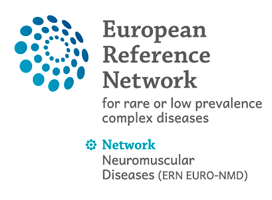01 Dec 2018
Consensus-based care recommendations for adults with myotonic dystrophy type 1
Authors:
Tetsuo Ashizawa, MD, Cynthia Gagnon, PhD, William J. Groh, MD, MPH, Laurie Gutmann, MD, Nicholas E. Johnson, MD, Giovanni Meola, MD, Richard Moxley III, MD, Shree Pandya, DPT, Mark T. Rogers, MD, Ericka Simpson, MD, Nathalie Angeard, PhD, Guillaume Bassez, MD, PhD, Kiera N. Berggren, MA, MS, Deepak Bhakta, MD, Marco Bozzali, MD, Ann Broderick, MD, MS, Janice L.B. Byrne, MD, Craig Campbell, MD,
Edith Cup, PhD, John W. Day, MD, PhD, Elisa De Mattia, PT, Denis Duboc, MD, Tina Duong, MPT, PhDc, Katy Eichinger, PhD, Anne-Berit Ekstrom, MD, PhD, Baziel van Engelen, MD, PhD, Belen Esparis, MD, Bruno Eymard, MD, Marla Ferschl, MD, Shahinaz M. Gadalla, MD, PhD, Benjamin Gallais, PhD, Todd Goodglick, MD, Chad Heatwole, MD, James Hilbert, MS, Venessa Holland, MD, MPH, Marie Kierkegaard, PhD, Wilma J. Koopman, NP, PhD, Kari Lane, RD, Daphne Maas, PT, MSc, Ami Mankodi, MD, Katherine D. Mathews, MD, Darren G. Monckton, PhD, David Moser, PhD, Saman Nazarian, MD, PhD, Linda Nguyen, MD, Peg Nopoulos, MD, Richard Petty, MD, Janel Phetteplace, MS, Jack Puymirat, MD, PhD,
Subha Raman, MD, Louis Richer, PhD, Elisabetta Roma, MD, Jacinda Sampson, MD, PhD,
Valeria Sansone, MD, PhD, Benedikt Schoser, MD, Laurie Sterling, MS, Jeffrey Statland, MD,
S.H. Subramony, MD, Cuixia Tian, MD, Careniña Trujillo, RN, MSN, Gordon Tomaselli, MD, Chris Turner, MD, PhD, Shannon Venance, MD, PhD, Aparajitha Verma, MD, Molly White, MA, and Stefan Winblad, PhD on behalf of the Myotonic Dystrophy Foundation.
Abstract
Purpose of review
Myotonic dystrophy type 1 (DM1) is a severe, progressive genetic
disease that affects between 1 in 3,000 and 8,000 individuals
globally. No evidence-based guideline exists to inform the care of
these patients, and most do not have access to multidisciplinary care
centers staffed by experienced professionals, creating a clinical care
deficit.
Recent findings
The Myotonic Dystrophy Foundation (MDF) recruited 66 in-
ternational clinicians experienced in DM1 patient care to develop
consensus-based care recommendations. MDF created a 2-step methodology for the project using
elements of the Single Text Procedure and the Nominal Group Technique. The process generated a 4-page Quick Reference Guide and a comprehensive, 55-page document that provides clinical care recommendations for 19 discrete body systems and/or care considerations.
Summary
The resulting recommendations are intended to help standardize and elevate care for this patient population and reduce variability in clinical trial and study environments.increased repeat expansion and disease severity, as evidenced
by the average age of onset and overall morbidity of the
condition. An expansion of over 35 repeats typically indicates
an unstable and expanding mutation. An expansion of 50
repeats or higher is consistent with a diagnosis of DM1. DM1
is a multisystem and heterogeneous disease characterized by
distal weakness, atrophy, and myotonia, as well as symptoms
in the heart, brain, gastrointestinal tract, endocrine, and re-
spiratory systems. Symptoms may occur at any age. The
severity of the condition varies widely among affected indi-
viduals, even among members of the same family.
Comprehensive evidence-based guidelines do not currently
exist to guide the treatment of DM1 patients. As a result, the
international patient community reports varied levels of care
and care quality, and difficulty accessing care adequate to
manage their symptoms, unless they have access to multi-
disciplinary neuromuscular clinics.
Consensus-based care recommendations can help standard-
ize and improve the quality of care received by DM1 patients
and assist clinicians who may not be familiar with the sig-
nificant variability, range of symptoms, and severity of the
disease. Care recommendations can also improve the land-
scape for clinical trial success by eliminating some of the
inconsistencies in patient care to allow more accurate un-
derstanding of the benefit of potential therapies.

